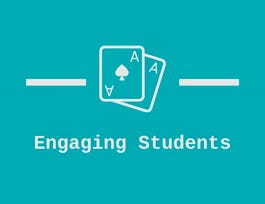This is an Exploratorium teacher professional development course taught by Teacher Institute staff, open to any science teacher (particularly middle or high school level) and science enthusiast. This is a hands-on workshop that explores topics and strategies teachers can use to help their students become active investigators of light.


Exploring Light: Hands-on Activities and Strategies for Teachers
Taught in English
Some content may not be translated
10,004 already enrolled
(54 reviews)
Details to know

Add to your LinkedIn profile
See how employees at top companies are mastering in-demand skills


Earn a career certificate
Add this credential to your LinkedIn profile, resume, or CV
Share it on social media and in your performance review

There are 5 modules in this course
Welcome to our course! This is a hands-on workshop designed for middle-school and high-school teachers and other people interested in teaching and learning about light. In this first week, we'll introduce you to our pedagogy at the <a href="http://www.exploratorium.edu/education/teacher-institute">Exploratorium Teacher Institute</a>, which is about supporting educators to incorporate the hands-on, inquiry-based experiences of our museum into classrooms. <br/><br/>We'll demonstrate exhibits and teach you how to do activities (which we call "<a href="http://www.exploratorium.edu/snacks">Science Snacks</a>") that explore and investigate natural phenomena, and you will need to gather your own materials to do experiments on your own. We hope you will share teaching tips and facilitation strategies with each other as well. <br/><br/>We recommend you look through the materials below and follow the suggested course deadlines to get the most out of this experience. We also suggest you browse the discussion forums we've set up. To help you get started and find out who's in this course, please take a moment to <a href="https://www.coursera.org/learn/teach-light-color/forum/5gAzveDFEeWnSg7Jd1dn3w/discussions?sort=lastActivityAtDesc&page=1">introduce yourself in the forum.</a> Please also fill out our <a href="https://docs.google.com/forms/d/1QHNMDrg4_HpM7a2V07lxhYGOFrFbExoNz5mrGZIicWo/viewform">pre-course survey</a>, thanks!
What's included
3 videos3 readings
We don't just see with our eyes; our brain plays a big role in determining what we see. A huge percentage of the human brain is devoted to processing visual information, but we still can't make sense of everything going on around us, so we rely on certain "shortcuts" or tricks. In other words, your brain makes things up!<br/><br/>This week, we're going to explore a few interesting visual shortcuts and some of the technologies that have been invented to take advantage of them.<br/><br/>Your assignment is to watch the videos below, try some activities at home, and share your experience in the discussion forums.<ul><li>Collect data about your <a href="http://www.exploratorium.edu/snacks/peripheral-vision">peripheral vision</a> and compare with your classmates</li><li>Show off your afterimage designs for <a href="http://www.exploratorium.edu/snacks/bird-in-cage">Bird in a Cage</a></li><li>Take pictures of your experiments with <a href="http://www.exploratorium.edu/snacks/bird-in-cage">Colored Shadows</a></li></ul>We can't wait to see what you come up with!
What's included
7 videos2 readings
A historical timeline approach to studying light illustrates the importance of models to the advancement of science. Scientific models of light have changed over the years as more and better experiments were done. At the same time, an important skill as a teacher is choosing the simplest model to help a student towards understanding.This week, we'll revisit some famous experiments and different models of light to advance our own understanding.<br/><br/>We'd like you to start off by reading the introductory essay below. Then, watch the video demonstrations and try some activities on your own. This week, we'd also like you to pick an activity or two to share with someone else.<br/><br/>Don't forget to post photos, videos and comments in the discussion forum to share with your fellow students.
What's included
4 videos2 readings
This week, we're exploring optics and how to make images with light. In addition to our exhibit and activity demonstrations, you'll learn how to put activities together into a lesson that helps students develop and test a mental model of how the world works. <strong>We want you to do this lesson as a learner and then reflect and discuss with your peers in the forum. </strong><br/><br/>The lesson is designed as a series of experiments, each one giving you a piece of information that lets you make a mental model. You'll be presented with several scenarios, asked to make a prediction <strong>(it's VERY important that you stop and do this at each stage of the video),</strong> and then we'll reveal what happens. You'll have an opportunity to revise and adjust your model at each stage. <br/><br/> For those of you taking this course for credit, we recommend you begin working on your <a href="https://www.coursera.org/learn/teach-light-color/peer/GKysS/design-your-own-lesson">peer-reviewed assignment</a>. If you want some feedback before you submit your assignment, we suggest you post questions and drafts of your lesson plan in the forum.
What's included
5 videos2 readings1 discussion prompt
What is light? Sometimes we model it as a wave, sometimes as a particle. Light is light. Nevertheless, the wave properties of light lend themselves towards a rich array of experiments that help further our understanding.<br/><br/>This is the final week of content for our course. Please continue to do activities this week, but also take a few moments to share what you learned, and any suggestions you have for us.<br/><br/>If you are taking the course for a grade, please submit your final assignment and complete the required peer reviews before the deadline. <br/><br/>We hope you have enjoyed this experience and that you'll come check out our museum in San Francisco!
What's included
7 videos2 readings1 peer review
Instructors


Offered by
Recommended if you're interested in Physics and Astronomy

University of Virginia

Coursera Project Network

University of California, Irvine

Yonsei University
Why people choose Coursera for their career




Learner reviews
Showing 3 of 54
54 reviews
- 5 stars
85.18%
- 4 stars
11.11%
- 3 stars
1.85%
- 2 stars
0%
- 1 star
1.85%

Open new doors with Coursera Plus
Unlimited access to 7,000+ world-class courses, hands-on projects, and job-ready certificate programs - all included in your subscription
Advance your career with an online degree
Earn a degree from world-class universities - 100% online
Join over 3,400 global companies that choose Coursera for Business
Upskill your employees to excel in the digital economy
Frequently asked questions
Access to lectures and assignments depends on your type of enrollment. If you take a course in audit mode, you will be able to see most course materials for free. To access graded assignments and to earn a Certificate, you will need to purchase the Certificate experience, during or after your audit. If you don't see the audit option:
The course may not offer an audit option. You can try a Free Trial instead, or apply for Financial Aid.
The course may offer 'Full Course, No Certificate' instead. This option lets you see all course materials, submit required assessments, and get a final grade. This also means that you will not be able to purchase a Certificate experience.
When you purchase a Certificate you get access to all course materials, including graded assignments. Upon completing the course, your electronic Certificate will be added to your Accomplishments page - from there, you can print your Certificate or add it to your LinkedIn profile. If you only want to read and view the course content, you can audit the course for free.
You will be eligible for a full refund until two weeks after your payment date, or (for courses that have just launched) until two weeks after the first session of the course begins, whichever is later. You cannot receive a refund once you’ve earned a Course Certificate, even if you complete the course within the two-week refund period. See our full refund policy.



